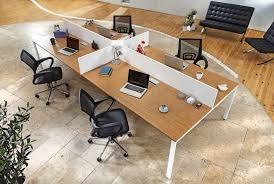In today’s dynamic work environment, the design and arrangement of office furniture play a crucial role in shaping team productivity. Modular office workstations have emerged as a popular solution that not only enhances collaboration but also maximizes the efficiency of workspace utilization. Unlike traditional fixed desks, modular workstations offer flexibility, adaptability, and a range of configurations that can be tailored to meet the needs of various teams. This article explores how these innovative designs can boost team productivity in numerous ways.
Flexibility to Adapt to Team Needs
One of the standout features of modular office workstations is their inherent flexibility. Teams often undergo changes in size, structure, and project requirements. Modular systems can be easily reconfigured to accommodate these shifts. For instance, a team that starts as a small group can expand its workspace as new members join without the need for significant investments in new furniture.
This adaptability is particularly advantageous for project-based work, where teams may form and disband quickly. Modular workstations allow for a seamless transition, enabling teams to set up temporary project spaces without disrupting the overall office layout. The ability to customize workstations not only caters to the specific needs of the team but also creates an environment that fosters collaboration and creativity.
Encouraging Collaboration and Communication
Modular office workstations are designed with collaboration in mind. By breaking down traditional barriers, these workspaces encourage open communication among team members. When employees are positioned within close proximity, it becomes easier to share ideas, ask questions, and provide feedback in real time. This kind of interaction can lead to quicker decision-making processes and a more dynamic workflow.
Moreover, many modular systems come with integrated technology, such as built-in power outlets, USB ports, and screen-sharing capabilities. These features facilitate teamwork by allowing employees to connect their devices and share information effortlessly. The result is an environment that not only supports collaboration but also keeps the team focused and engaged.
Personalization for Enhanced Comfort
Every individual has unique preferences when it comes to their workspace. Modular office workstations often offer various options for customization, allowing employees to personalize their work environment. From adjustable desks and ergonomic chairs to different storage solutions, these workstations can be tailored to suit individual needs.
When employees have the freedom to personalize their workspace, they are more likely to feel comfortable and invested in their work. Comfort is directly linked to productivity; when individuals are comfortable, they can focus better and work more efficiently. Furthermore, the ability to personalize their space can lead to a sense of ownership, motivating employees to take more pride in their work and contribute positively to team goals.
Efficient Space Utilization
In modern office design, maximizing space utilization is essential, especially in urban environments where real estate costs are high. Modular workstations optimize the use of available space by allowing for various configurations, such as clusters, pods, or linear setups. This versatility ensures that every square foot of the office is utilized effectively, accommodating more employees without sacrificing comfort or functionality.
Additionally, modular office furniture can be designed to include built-in storage solutions, minimizing clutter and creating a more organized workspace. A tidy environment can have a profound impact on productivity; employees are less likely to feel overwhelmed when their surroundings are orderly, leading to improved focus and performance.
Enhancing Focus Through Design
The design of modular office workstations can also significantly impact team productivity. Many systems incorporate sound-absorbing materials and privacy screens to reduce distractions and enhance focus. In open office environments, noise and visual distractions can hinder productivity, making it difficult for employees to concentrate on their tasks.
By integrating features that promote privacy and reduce noise levels, modular workstations create a balanced work environment. Employees can have the benefits of collaboration and interaction without the constant interruptions that often accompany traditional open-plan offices. This balance enables individuals to immerse themselves in their work, fostering a culture of productivity.
Supporting Wellness and Work-Life Balance
The modern workforce places a high value on health and wellness, and modular office workstations can contribute to this trend. Many modular systems are designed with ergonomics in mind, featuring adjustable heights, sit-stand options, and other elements that promote healthy working postures.
When employees have access to ergonomic office furniture, they are less likely to experience discomfort and fatigue, leading to improved overall well-being. A focus on wellness not only benefits individual employees but also enhances team productivity. When employees feel good physically, they are more engaged and motivated to perform at their best.
Additionally, the ability to create designated relaxation areas within modular office designs can contribute to a healthier work-life balance. Breakout spaces or quiet zones provide employees with the opportunity to step away from their desks, recharge, and return to their work with renewed energy and focus.
Cost-Effectiveness and Sustainability
Investing in modular office workstations can be a cost-effective solution for businesses looking to optimize their workspaces. Because these systems are designed for reconfiguration, companies can save on future furniture purchases and renovations. Instead of investing in entirely new office furniture as the team evolves, businesses can simply adapt their existing modular systems to meet changing needs.
Furthermore, many manufacturers are increasingly focused on sustainability, using eco-friendly materials and practices in the production of modular office furniture. By choosing sustainable options, businesses not only contribute to environmental conservation but also appeal to a workforce that values corporate social responsibility.
In conclusion, modular office workstations are a powerful tool for enhancing team productivity in today’s fast-paced work environment. Their flexibility, design features, and focus on employee wellness make them a valuable investment for any organization looking to foster collaboration and maximize efficiency. As businesses continue to evolve, embracing innovative workspace solutions will be key to maintaining a productive and engaged workforce.






























